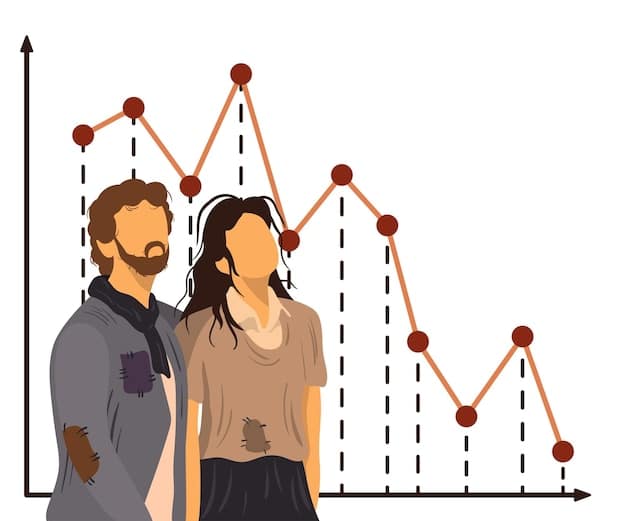Consumer Confidence Plummets: Recession Fears Intensify in US

Consumer confidence in the U.S. has sharply declined, hitting a six-month low, triggering increased anxieties about a potential economic recession amid concerns over inflation and the overall financial outlook.
The latest Consumer Confidence Index Plummets to Lowest Level in 6 Months – Economic Recession Fears Grow across the United States, signaling a potential shift in the economic landscape. This decline reflects growing concerns among consumers about the current financial climate and their expectations for the near future.
Understanding the Consumer Confidence Index
The Consumer Confidence Index (CCI) is a vital economic indicator that measures how optimistic or pessimistic consumers are regarding their expected financial situation. Changes in the CCI can signal potential economic shifts, making it a closely watched metric by economists, investors, and policymakers.
This index is based on surveys of households about their feelings on current economic conditions and their outlook for the next six months. A significant drop in the CCI, such as the recent plummet to a six-month low, often precedes economic downturns, though it’s not always a definitive predictor.
Key Components of the CCI
The CCI is composed of two main components: the Present Situation Index and the Expectations Index. Each provides unique insights into consumer sentiment.
- Present Situation Index: Reflects consumers’ current assessment of the business environment and labor market conditions.
- Expectations Index: Measures consumers’ short-term expectations for income, business, and labor market conditions.
When both components decline simultaneously, it indicates a broad-based weakening of consumer sentiment and heightened concerns about the economy’s trajectory. Understanding these components is crucial for interpreting the overall CCI and its implications.
A lower CCI suggests that consumers are becoming more cautious with their spending, which can lead to decreased economic activity. This caution often stems from concerns about job security, income growth, and overall economic stability. The recent drop underscores the fragility of the economic recovery and the potential for further challenges.

Factors Contributing to the Decline
Several factors have contributed to the recent decline in consumer confidence. These range from rising inflation rates to concerns about interest rate hikes by the Federal Reserve.
Understanding these factors is essential for grasping the full context of the CCI decline and its potential consequences for the economy.
Inflation and Purchasing Power
Rising inflation is a significant factor eroding consumer confidence. As the cost of goods and services increases, consumers find their purchasing power diminished, leading to anxiety about making ends meet.
- Increased living costs: Higher prices for essentials like food, energy, and housing strain household budgets.
- Reduced discretionary spending: Consumers cut back on non-essential purchases to cope with rising costs.
- Wage stagnation: Wage growth lagging behind inflation exacerbates financial stress.
The impact of inflation on consumer sentiment cannot be overstated. Persistent inflation can lead to a vicious cycle of reduced spending and economic slowdown.
The Federal Reserve’s actions also play a crucial role. Interest rate hikes, while intended to curb inflation, can also dampen consumer sentiment by increasing borrowing costs for mortgages, auto loans, and credit cards.
Impact on Consumer Spending
A decline in consumer confidence often translates directly into reduced consumer spending, which is a major driver of the U.S. economy. When consumers are pessimistic about the future, they tend to save more and spend less.
This can have a cascading effect on businesses, leading to decreased revenues, hiring freezes, and even layoffs. The impact on various sectors can be significant.
Sectors at Risk
Certain sectors are more vulnerable to fluctuations in consumer spending. These include:
- Retail: Lower spending on discretionary items impacts retailers’ bottom lines.
- Automotive: Major purchases like cars are often postponed during times of economic uncertainty.
- Housing: Reduced confidence can dampen demand for new and existing homes.
These sectors are particularly sensitive to changes in consumer sentiment, and their performance can serve as a leading indicator of broader economic trends.

Businesses must adapt to evolving consumer behavior by offering promotions, discounts, and value-added services to maintain sales. Those that fail to adjust risk losing market share and facing financial difficulties.
Expert Opinions and Forecasts
Economists and financial analysts offer varied perspectives on the implications of the recent CCI decline. Some view it as a temporary setback, while others see it as a harbinger of a more significant economic downturn.
Understanding these expert opinions can provide a balanced view of the potential risks and opportunities ahead.
Optimistic vs. Pessimistic Views
Economists’ forecasts range from cautious optimism to outright pessimism. The differing views reflect the complexity of the economic landscape and the many variables at play.
- Optimistic View: Some argue that the CCI decline is a temporary reaction to specific events and that the economy will rebound as inflation moderates.
- Pessimistic View: Others believe that the decline is a sign of deeper underlying issues and that a recession is increasingly likely.
The reality likely lies somewhere in between. The economy faces significant challenges, but also has underlying strengths that could mitigate the worst potential outcomes.
The Federal Reserve’s monetary policy decisions will play a critical role in shaping the economic outlook. Balancing the need to curb inflation with the desire to avoid a recession is a delicate task.
Historical Context: CCI and Recessions
Examining historical CCI data can provide valuable insights into the index’s predictive power. In the past, significant declines in consumer confidence have often preceded economic recessions.
However, it’s important to note that the CCI is not a perfect predictor, and other factors must also be considered.
Past Recessions and CCI Trends
Analyzing past recessions and their corresponding CCI trends can help us understand the index’s limitations and potential uses.
- 2008 Financial Crisis: A sharp decline in consumer confidence preceded the 2008 recession, reflecting growing concerns about the housing market and financial system.
- Dot-Com Bubble: Similarly, declining confidence in the early 2000s foreshadowed the bursting of the dot-com bubble and the subsequent recession.
These historical examples highlight the CCI’s ability to capture shifts in consumer sentiment and its potential to serve as an early warning sign of economic trouble.
The current economic situation differs from past recessions in several key aspects. Factors such as the strength of the labor market and the level of household savings could influence the outcome.
Strategies for Consumers and Businesses
In light of the declining consumer confidence, both consumers and businesses should consider strategies to navigate the uncertain economic environment.
Proactive measures can help mitigate risks and capitalize on potential opportunities.
For Consumers
Consumers can take steps to protect their financial well-being and prepare for potential economic challenges.
- Budgeting and saving: Creating a budget and increasing savings can provide a financial cushion during uncertain times.
- Debt management: Reducing debt and avoiding new borrowing can lower financial stress.
- Investing wisely: Diversifying investments and seeking professional financial advice can help protect assets.
Taking these steps can provide consumers with a greater sense of control and security in the face of economic uncertainty.
Businesses should focus on adapting to changing consumer behavior, managing costs, and seeking new opportunities for growth. Innovation and flexibility will be key to success.
| Key Point | Brief Description |
|---|---|
| 📉 CCI Decline | Consumer Confidence Index hits a 6-month low. |
| 💰 Spending Impact | Reduced spending in retail, automotive, and housing. |
| 📈 Inflation | Rising costs erode consumer purchasing power. |
| 🏦 Fed Policy | Interest rate hikes impacting borrowing costs. |
Frequently Asked Questions
▼
The Consumer Confidence Index (CCI) is an economic indicator that measures consumers’ level of optimism regarding the economy. It is based on surveys asking consumers about their financial situations and expectations for the future.
▼
The CCI is important because consumer spending drives a large portion of the economy. A higher CCI indicates more confidence, which typically leads to more spending. Conversely, a lower CCI suggests less spending and potential economic slowdown.
▼
Several factors can influence the CCI, including inflation rates, employment figures, interest rates, and geopolitical events. These factors collectively shape consumers’ views on their financial stability and prospects.
▼
A declining CCI can lead to reduced sales and revenues for businesses as consumers cut back on spending. Businesses may need to adjust their strategies by offering discounts or focusing on essential products to maintain sales.
▼
Consumers can prepare for economic uncertainty by creating a budget, saving more, managing debt, and seeking financial advice. These steps can help them navigate challenging economic times with greater resilience.
Conclusion
The recent plunge in the Consumer Confidence Index serves as a stark reminder of the economic uncertainties facing the United States. Rising inflation, concerns about interest rates, and a general sense of unease about the future are weighing heavily on consumers. Whether this decline is a temporary blip or a harbinger of a broader recession remains to be seen. However, both consumers and businesses should take proactive steps to protect their financial well-being and prepare for potential challenges ahead. Staying informed, budgeting wisely, and adapting to changing conditions will be crucial for navigating the economic landscape in the coming months.





